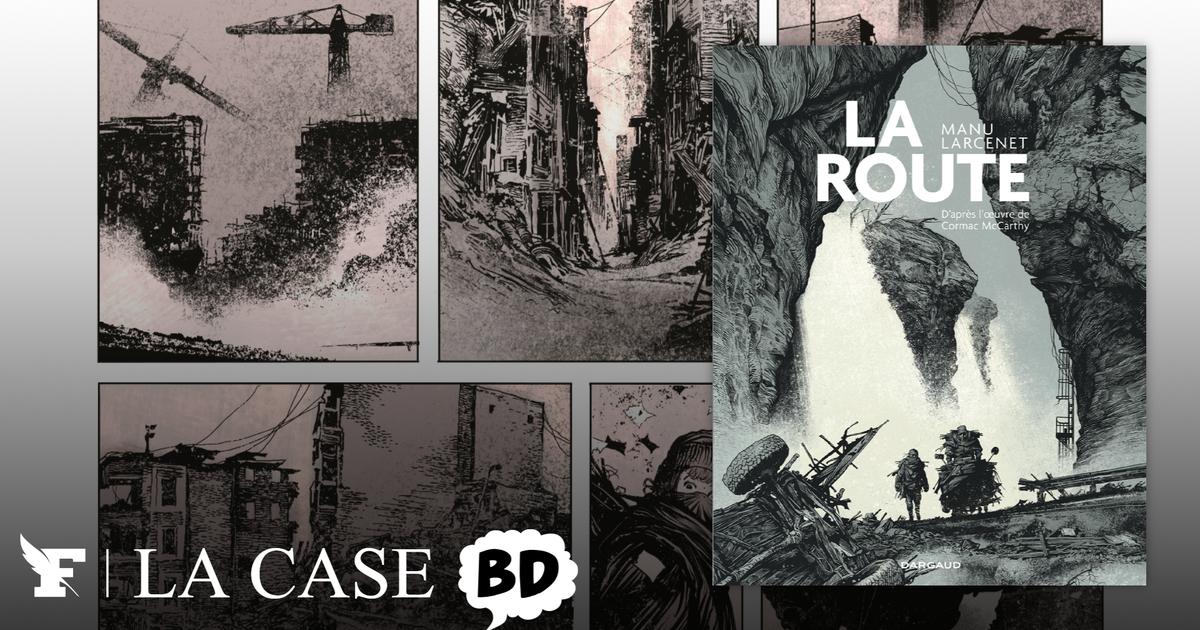Enlarge image
Musician Natalie Mering aka Weyes Blood
Photo:
Neil Krug / Cargo Records
Album of the week:
Weyes Blood - »And in the Darkness, Hearts Aglow«
Who hasn't experienced this in the past few weeks: After the general mumbling about the pandemic, you dare to go out again, go to a concert or a party - and first you have to get used to being among people.
Or people in general.
Then you sit despondently in a corner, sipping your drink, watching people pretend everything is the same - and wondering if you're the only one who's changing, maybe cranky , no longer feels compatible.
Hasn't so much fundamentally changed?
Isn't there war?
Isn't the world dying of climate collapse?
Can we just carry on as before?
The American musician Natalie Mering, who calls herself Weyes Blood, makes music that cushions this sentiment, this "sinking feeling" of bottomlessness, warmly and emphatically.
The very first song on her new album describes the above-mentioned party situation of alienation, but Mering calms her listeners with a reassuringly confident piano touch, luxuriously melancholic Carpenters pop and self-confident vocals that channel role models like Carole King and Joni Mitchell: »It's not just me 'It's everybody,' she sings: It's not up to you.
We all feel the same uneasiness in the face of the apocalypse.
But hey, it's okay, »we all bleed the same way«.
Mering is also a fascinating live personality, who initially appears fragile, with long, dark brown hair, but such a magical, sublime singing voice that she even forces notoriously chattered Berlin concert halls into devotional silence without much emphasis or volume.
Now it turns out that she might even be a pop psychic.
Even their last album "Titanic Rising" leaned far into the general foreboding of doom with comforting widescreen sound and Hollywood grandeur - at that time there was no talk of Corona and lockdowns and war in Ukraine.
"And in the Darkness, Hearts Aglow" is now the second part of a kind of Doom trilogy - and takes a bubble bath in the emotional waves of melancholy, into which one, shivering comfortably, is very happy to let oneself slide.
Instead of »Titanic«, »Poseidon Inferno« is the appropriate foil this time, where in the cruise ship disaster film of the same name from 1972, the hippie band, on the eve of the killer wave, smashes sweetly, slightly soapy, but irresistibly: »There's gotta be a morning after, if we could hold on through the night.«
In a way subtly refined with electronic elements, which at the moment only the Arctic Monkeys can master alongside her, Mering reproduces this nostalgically familiar 70s soundscape, in which choirs carefully colour, strings sigh and swaying waltz arrangements take you into Laurel Canyon, in some harmonies even to the Eagles or musicals like »Hair«.
In »Grapevine« she makes herself the muse of climate catastrophes and daringly throws herself into the consuming embers of a romance that is also an unstoppable conflagration: »California is my body / And your fire runs over me«, she sings.
"God Turn Me Into a Flower", accompanied almost exclusively by organ, angelic choir and glistening, cosmic synthesizer sounds, is a commitment to humility and tenderness that carries the expectation of impending defeat, the transience of fame and everything earthly: "It's good to be soft when they push you down.« Be a flower and bloom while you can.
It won't be long anyway.
Ah, sigh.
advertisement
Weyes Blood
And in the Darkness, Hearts Aglow
Label: Sub Pop / Cargo
Label: Sub Pop / Cargo
approx. €15.99
price query time
11/18/2022 4:31 p.m
No guarantee
Order from Amazon
Order from Thalia
Order from Yourbook
Product reviews are purely editorial and independent.
Via the so-called affiliate links above, we usually receive a commission from the retailer when you make a purchase.
More information here
But the beauty of Weyes Blood is that since their debut »The Innocents«, they have continued to perfect their fatalistic lullabies on the way to the all-encompassing darkness, so that they can now disarm even the greatest reservations about kitsch.
When she longs for someone to reignite her cold heart on "Hearts Glow," with its Christmas chimes, guitar solo, and full-fat lard pounding, you melt away as blissfully reluctantly as the festively cozy Christmas Eve with "Love Actually" on TV and Frost am Window.
"It's about the power of having your heart so broken that it would emanate a light," says Natalie Mering about her best album to date: A big bang of hope can arise from the greatest destruction.
And love.
As long as we can pull ourselves together and forgive.
The happiest song therefore comes shortly before the end, with lively acoustic guitars, cowbells and funny baaa-ba-ba-ba-baaaah choirs as well as a pop refrain that is almost catchy for this eternally ethereal music: »The Worst Is Done«: We have the worst behind us?
Wait.
An album is still missing.
But as is often the case with trilogies, it might be the middle section that lasts at the end.
(9.2)
Listened briefly:
Neil Young with Crazy Horse - »World Record«
more on the subject
Musician Neil Young on his ecological commitment: »I am beyond anger« An interview by Andreas Borcholte and Arno Frank
The 42nd studio album by alto and eco-rocker Neil Young begins so crookedly and cutely that you think you're more on the »Muppet Show« than in the »barn« with Crazy Horse: piano tinkle, country babble and a chorus sung in a child's voice that The topic of »World Record« gets to the point early on: »Love earth / And your love comes back to you / Such an easy thing to do«: love the earth and the earth will love you back.
Ah, a hippie dream.
Later, Young also plays the pump organ and, uh, plastic tub to lumbering declarations of love to Mother Nature, which we can still save with affection, consideration and biodiesel.
Nils Lofgren, Billy Talbot and Ralph Molina, together with their boss, toss their way through sometimes delicate folk (»This Old Planet«) and sometimes through rough and noisy (»I Walk With You«, »Break the Chain«).
What is it all about
Young recently explained in the SPIEGEL interview.
Among other things, why there is no contradiction when many songs are about environmental concerns and other world pains, but the central piece of the album, which lingers for 15 minutes into eternity, is ultimately a nostalgic ode to "Chevrolet".
The Crazy Horse Trip was originally produced by Rick Rubin, but one gets the impression that most of the time the reduction guru just sat quietly in the corner and nodded his head mildly - all sound and consciousness controls wide open.
15 minutes into eternity, but ultimately a nostalgic ode to »Chevrolet«.
The Crazy Horse Trip was originally produced by Rick Rubin, but one gets the impression that most of the time the reduction guru just sat quietly in the corner and nodded his head mildly - all sound and consciousness controls wide open.
15 minutes into eternity, but ultimately a nostalgic ode to »Chevrolet«.
The Crazy Horse Trip was originally produced by Rick Rubin, but one gets the impression that most of the time the reduction guru just sat quietly in the corner and nodded his head mildly - all sound and consciousness controls wide open.
(7.6)
Pole - "Tempus"
Transience is the big theme in pop music right now, it seems.
For Stefan Betke, the Berlin musician who hides behind the name Pole, the transcendence of the present, past and possible future has always been a basic motif of his minimal electronic and dub sounds.
He laid out the basics at the beginning of the noughties on his first albums entitled »1«, »2« and »3«, since »Fading«, a meditation on dementia, he has expanded the spectrum - and ends up on »Tempus« with a lot of pointed ones Percussion elements almost in jazz.
However, it flows along as slowly and granularly as »Grauer Sand«, that's the name of one of the slightly livelier pieces, which seems like a slow-motion version of the South African Amapiano house sound that's currently in vogue.
In »Cenote«, Betke lulls his listeners into a devotional flow with electronic water drop noises for several minutes, until after four and a half minutes a loud, individually struck snare drum tears you out of the perceived time oblivion like a particularly nasty alarm clock.
"Stechmück" is also beautiful and insidious, tearing through the leisurely dub calm with rumbling sounds like that pesky insect.
The howling sound in it is said to be the last gasp of his dying Moog synthesizer.
Tempus fugit, but Pole's patient but never monotonous music puts the flow of time under the microscope until seconds and minutes can be admired like molecules on whose surfaces epics are played out.
An album that will stay.
individually struck snare drum rips out of the perceived time oblivion like a particularly nasty alarm clock.
"Stechmück" is also beautiful and insidious, tearing through the leisurely dub calm with rumbling sounds like that pesky insect.
The howling sound in it is said to be the last gasp of his dying Moog synthesizer.
Tempus fugit, but Pole's patient but never monotonous music puts the flow of time under the microscope until seconds and minutes can be admired like molecules on whose surfaces epics are played out.
An album that will stay.
individually struck snare drum rips out of the perceived time oblivion like a particularly nasty alarm clock.
"Stechmück" is also beautiful and insidious, tearing through the leisurely dub calm with rumbling sounds like that pesky insect.
The howling sound in it is said to be the last gasp of his dying Moog synthesizer.
Tempus fugit, but Pole's patient but never monotonous music puts the flow of time under the microscope until seconds and minutes can be admired like molecules on whose surfaces epics are played out.
An album that will stay.
The howling sound in it is said to be the last gasp of his dying Moog synthesizer.
Tempus fugit, but Pole's patient but never monotonous music puts the flow of time under the microscope until seconds and minutes can be admired like molecules on whose surfaces epics are played out.
An album that will stay.
The howling sound in it is said to be the last gasp of his dying Moog synthesizer.
Tempus fugit, but Pole's patient but never monotonous music puts the flow of time under the microscope until seconds and minutes can be admired like molecules on whose surfaces epics are played out.
An album that will stay.
(8.5)
Richard Dawson - "The Ruby Cord"
Even in the
weird
World by Richard Dawson is about the entanglement of the passage of time.
»The Ruby Cord« is the conclusion of a trilogy that began with »Peasant« in a folk-spun way in pre-medieval Britain, and on »2020« deals with contemporary things such as jogging or work-life balance in an unusually straightforward way - and now with the appropriate fantasy complexity 500 years into the future of Albion.
Lo and behold: nothing has changed!
The "Hermit" from the first song could have started his hermitage as a court jester or ballad singer on "Peasant," but now he squints out of his cave and promptly sees a robot kneeling in the street: "Up ahead I could see what looked to be a robot knelt in the lane, revealed at a higher magnification as a gilt-clad knight of Old submerged at the waist in unyielding concrete,
flailing his arms to a windmill of gold«, says the text, which is quoted here in great detail to convey an impression of the language and style of this eclectic, highly poetic music novel.
"Hermit" alone is 41 minutes long, ebbs and flows, has quiet and poignant moments, then again little pop songs and big choruses nested and laced within it.
Imagine: Robert Wyatt, Richard Thompson and Nick Saloman from The Bevis Frond smoking a lot of good weed along with the ghost of Syd Barrett and recording an album to last forever,
has quiet and poignant moments, then again little pop songs and big choruses nested and laced within it.
Imagine: Robert Wyatt, Richard Thompson and Nick Saloman from The Bevis Frond smoking a lot of good weed along with the ghost of Syd Barrett and recording an album to last forever,
has quiet and poignant moments, then again little pop songs and big choruses nested and laced within it.
Imagine: Robert Wyatt, Richard Thompson and Nick Saloman from The Bevis Frond smoking a lot of good weed along with the ghost of Syd Barrett and recording an album to last forever,
Science folk,
so to speak.
Then there are another six pieces, the shortest, the jubilantly crowing "Thicker Than Water," is five and a half minutes long, a haiku to Dawson's meandering long-poem epic.
Dawson's thesis is that in the future we will all have crept into the fantasy worlds of virtual games, metaverses or Schwöri platforms in the face of political, economic and ecological sadness.
But even the nihilist Dawson, disguised as a folk bard, finds a glimmer of hope and love for humanity somewhere amid the cacophony of »The Fool«.
How?
Why?
It will take 500 years in a dark cave with headphones to unravel and understand.
At least.
And then there's a robot kneeling outside.
Far out.
(8.0)
Pogendroblem - »All I have left are my skills«
One can, of course, describe the uneasiness about the world and the circumstances in a far more concise and less emotional way.
The astonishing punk band Pogendroblem from Bergisch-Gladbach or Cologne shows how it's done on their second album: No song is longer than two and a half minutes, some only need 90 seconds to add intelligent insights to the discourse with energetic Dead Kennedys pressure fight: »What do you numb yourself with«, asks the DIY band with the Druffi name, but what is meant is not the drugs or the pogen, but rather everyday lies such as the »International Self Care Day« or feel-good bubbles of the same spirit in which one can relax morally on the right side, but out there, in the realpolitik of cold neoliberalism, will still fail with a bang ("The Simple Messages").
Despite their distrust of catchy lifestyle soaps by politicians and large corporations, Pogendroblem, who can easily be located on the very far left of the spectrum, still have a few slogans of their own ready: »System change not climate change«, »Feminism or brawl«, »Antifa remains manual work« and, of course, »Never again Germany«.
Isn't everything really that simple?
Nope: "You give me the feeling that real life is possible," it says urgently in "The Feeling," then
Isn't everything really that simple?
Nope: "You give me the feeling that real life is possible," it says urgently in "The Feeling," then
Isn't everything really that simple?
Nope: "You give me the feeling that real life is possible," it says urgently in "The Feeling," then
matter of fact
, as only a good post-punk rock song can: "It's wrong." Outside the system, the Rhinelanders, who recently had a drummer, see themselves well equipped for the gender-parity zeitgeist, but not.
»Life is too expensive, where is the wealth tax?«, Pogendroblem formulate in a song that is mockingly described as a social-democratic song about realpolitik, to the French horn blowing.
A battle cry for the German winter of 2022. Such skills are in demand right now: After all, there is also a shortage of skilled workers in the punk industry.
(7.7)









/cloudfront-eu-central-1.images.arcpublishing.com/prisa/4QT3HGW4X5BADO3G3M2U5IJ5PI.jpeg)





